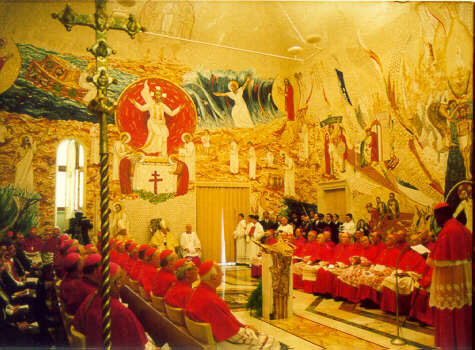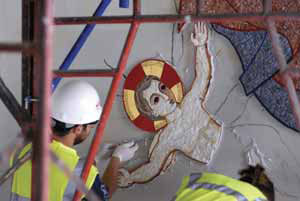
 |

A Monastery for Mosaicists
The Centro Aletti in Rome is an international community of artists and theologians from the Orthodox, Oriental and Catholic Churches. The director is the distinguished Jesuit mosaic artist Father Marko
Rupnik, best known for mosaicing a Vatican chapel for Pope John
Paul II, and commissions don’t come much more distinguished
than that, as Michelangelo would confirm. Back in November 1996 the Catholic Church celebrated the fiftieth anniversary of Pope John Paul II’s ordination to the priesthood. The cardinals in particular had a whip-round and gave the pope a sum of money to spend on anything he liked. He decided to spend it on mosaicing the Redemptoris Mater chapel in the Vatican. And he wanted it decorated in a way which would embody the encounter between Eastern Orthodox Churches and the Roman Catholic Western Church. As he put it, “The chapel will be a sign of the unity between the Eastern Churches and the See of Peter. It will also have a particular ecumenical value and be an important presence of the Eastern tradition in the Vatican”. It would in fact be a bit of Byzantium in the heart of Rome.
Father Rupnik is a theologian and mosaic artist from Slovenia, and he has done mosaics for many churches. You can get a very good idea of how he and his team operate by visiting the website of the Sacred Heart University, Fairfield, Connecticut, USA; there are photos and videos of them working directly on the wall of the chapel. The direct method is of course the preferred method for any church mosaic mural, being the method the Byzantines always used; it gives a life and sparkle to the surface that the reverse method cannot begin to provide. The Centre is primarily a study and research centre where Christian scholars and artists from Central and East Europe meet Western colleagues and seek answers to the questions raised by today’s women and men. The Centre offers a space where Orthodox and Oriental and Catholic Christians live together and work towards meeting the future and the challenges that it will bring. Together they study the encounter between the Christian faith and the cultural dynamics of the modern age. They seek answers that take into account the Christian tradition of the East and West in such a way that together they point to the living Christ. (So it was no wonder Pope John Paul gave them the Redemptoris Mater job.) The Centre fosters a style of life in which intellectual research, spirituality, the apostolate, and the practical aspects of everyday life are integrated. This is achieved by persons and Churches encountering each other, finding inspiration in traditions, questioning current issues, and embodying a theology which translates itself into pastoral activity. Artistic creation contributes to forming a precise methodology, in such a way that theology, spirituality, liturgy, and culture constitute a living organism. Areas of Activity:
|
All
content is copyright of © Mosaic Matters and its contributors.
All rights reserved
Mosaic
Matters is:
Editor: Paul Bentley
Web Manager/Designer: Andy Mitchell

 The
task of planning, designing and executing the chapel mosaics was
given to the Centro Aletti of the Pontifical Oriental Institute;
in other words to Father Marko Rupnik S.J. and his assistants. As
was proper, Rupnik invited a Russian mosaicist to contribute, one
Aleksandr Kornukhov, who did the east wall. Ironically, as some
of our readers may recall, when the chapel was re-opened in 1999
it was Kornukhov who got the publicity and the photo-ops with the
Pope, not Father Rupnik. You can enjoy a virtual reality tour of
the finished chapel by going to Redemptoris Mater.
The
task of planning, designing and executing the chapel mosaics was
given to the Centro Aletti of the Pontifical Oriental Institute;
in other words to Father Marko Rupnik S.J. and his assistants. As
was proper, Rupnik invited a Russian mosaicist to contribute, one
Aleksandr Kornukhov, who did the east wall. Ironically, as some
of our readers may recall, when the chapel was re-opened in 1999
it was Kornukhov who got the publicity and the photo-ops with the
Pope, not Father Rupnik. You can enjoy a virtual reality tour of
the finished chapel by going to Redemptoris Mater. And
now for the Centro Aletti.
And
now for the Centro Aletti.